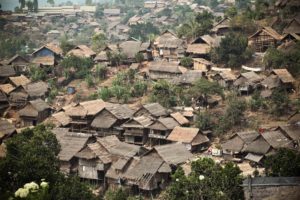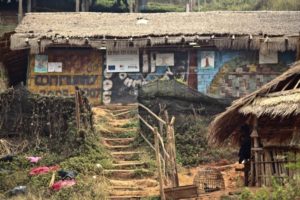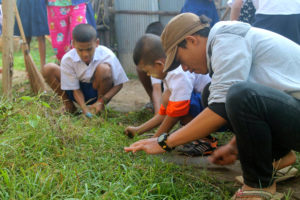
Umphium Refugee Camp
At only 11 years old, Zaw Win (name changed for privacy) was forced to leave Myanmar and become one of the 120,000 refugees living in nine refugee camps along the Thai-Myanmar border. As a result of decades of conflict and political unrest, Zaw Win, like many others, could no longer stay in Myanmar and sought refuge in neighboring Thailand. Living in Mae La Oon camp came with its own challenges: being separated from his family, disruptions to his education, and lack of economic opportunity once he graduated. Despite these challenges, Zaw Win was able to complete high school in 2009, but faced a future of uncertainty and limited prospects for continued education or jobs.
Since 1980, World Education has provided education opportunities to refugee and displaced populations on both sides of the Thailand-Myanmar border. Through teacher training, curriculum development, youth leadership development, advocacy for policy change, and community support to education, World Education has increased access to education, improved quality of services, and developed the capacity of local partners.
Higher Education
To help refugee youth like Zaw Win build the skills and knowledge they need, World Education and local partner organizations provide refugee youth with access to higher education programs inside and outside the camps. Through programs including Global Border Studies (GBS), the English Immersion Program (EIP), and Wide Horizons, World Education brings together youth from diverse backgrounds to learn new skills and tackle the difficult problems facing their communities. To date, 3,115 youth have graduated from higher education programs under the Project for Local Empowerment (PLE).

English Immersion Program school based in Umpheim Camp
These programs follow a similar model, but each has a specialized field of study. All programs offer a 1-2 year residential, immersive English component in which students practice leadership and problem-solving, and explore issues of diversity and conflict resolution. In each, a cohort of about 20 students from many ethnic groups of Myanmar lives, studies, and works together, speaking only English. Coursework covers skills building for community development, English language, computers, social studies, translation and interpretation, and cross-cultural communication and critical thinking. Students practice leadership skills through rotating positions in school governance and through a series of projects in nearby neighborhoods, ensuring that experience and reflection drive their learning as much as their lessons. GBS offers a focus on conflict resolution and peace-building; EIP emphasizes teacher training and translation; and Wide Horizons specifically works with young people employed by local community-based organizations, training them in project cycle management and community service. At the end of the academic coursework, each program has a one-year internship component for students to apply their learning and become active leaders in their communities.
A Strong Tree Can Nest a Thousand Birds
After working with a local organization, Assistance Association for Political Prisoners (AAPP), for a few years after high school, Zaw Win knew he wanted to further his education in project management in order to contribute to the development of civil society in his country. Successfully completing a competitive application process, Zaw Win was admitted to Wide Horizon’s intensive study and fieldwork course in community development. While at Wide Horizons, Zaw Win met other students from diverse backgrounds, built new skills, and began to understand the role he could play in his community.
“If not for Wide Horizons, I would not know what community is,” he remarked. He learned about problem solving, effective community development, and how to critically think about and analyze problems. After completing his internship, he was recruited by an education community based organization to be a coordinator, supporting students and helping them to succeed at their internships.

Wide Horizons student conducting a community development project
Zaw Win credits much of his success, confidence, and hopefulness to his education. Like many of his Wide Horizons classmates, his hopefulness translates into building a better future for Myanmar: “No matter what happens, you have to be confident enough to still have hope,” he says. “You must push yourself to try to find a solution and push out your idea. In our communities on the Thailand-Myanmar border, there is a lot of space at the top. As long as you make an effort, you will contribute to a solution. A strong and healthy tree can nest a thousand birds.”
Over the past five years, World Education has implemented the education component of the USAID-funded Project for Local Empowerment in five provinces and seven refugee camps in Thailand and four states in Myanmar. Since 2011, the project has trained over 10,000 teachers; it reaches more than 180,000 children each year and 3,115 youth have graduated from higher education programs. Under PLE, World Education has also developed a comprehensive system of organizational development support for 12 local partner organizations. As political changes within Myanmar result in a more peaceful country, many refugees living in the camps hope to return.
